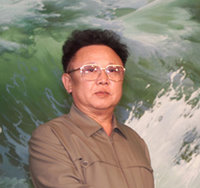Kim Jong Il is dead, and the world is wondering what to do about it. The task of leading North Korea has fallen to an inexperienced 27-year-old without a major constituency, even as the threat of regime collapse worries both friends and enemies of the largely isolated nation. What should Washington, Beijing, Seoul and Tokyo do in order to avoid a crisis? Some observers are arguing that this represents an opportunity for the United States to push hard against the DPRK, hopefully causing it to topple. This would be a mistake; the DPRK is likely not only to survive such pressure, but to respond by lashing out in dangerous and unpredictable ways. A much better approach would be to reach out to North Korean factions potentially interested in reintegrating the DPRK into the international community, in the hopes of tipping the balance of power within the regime.
Kim Jong Il’s legacy is clear. He utterly failed to adjust to the post-Cold War reality, in which North Korea could no longer depend on the good graces of the Soviet Union and in which even the support of the People’s Republic of China could be tenuous. He devoted enormous resources to a nuclear weapons program that gave the DPRK no significant strategic advantage and further contributed to its international isolation. Kim also failed to open the North Korean economy in any meaningful way, leading to a collapse in North Korean living standards. Finally, the DPRK’s human rights record under Kim’s rule has been unspeakably awful. In the end, Kim’s signal achievement was the ability to survive long enough to die in power, without even having assured the succession of his son, Kim Jong Un.
Kim leaves behind a “cult of personality” system that has historically provided mixed results. Mao Zedong, for example, was unable to set the course for Chinese policy following his death, or to prevent infighting between competing factions. The Chinese Communist Party ultimately survived, as did the Soviet Union following the death of Stalin, which gave rise to a similar crisis. However, the DPRK lacks the kind of broadly accepted narrative of the relationship between the people and the state that the Mao-era PRC and Stalin-era USSR possessed.

